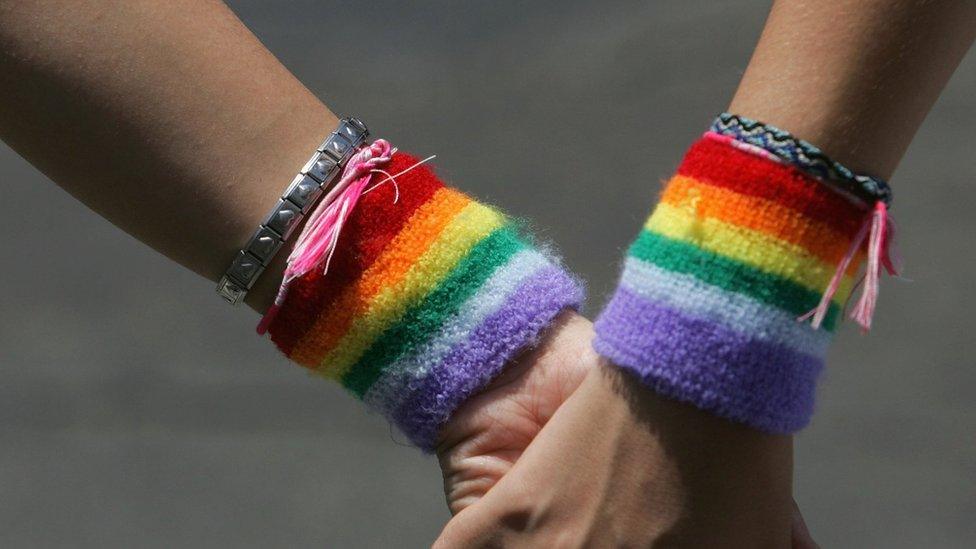LGBT harassment at work widespread, TUC survey suggests
- Published

More than two-thirds of LGBT people in the UK have been sexually harassed at work, a survey suggests.
Of 1,151 LGBT people polled by the Trades Union Congress, 68% said they had experienced harassment, with 42% saying colleagues had made unwanted comments about their sex life.
More than a quarter (27%) said they had received unwelcome sexual advances.
The government said it was planning to shortly consult on how to strengthen existing laws on harassment.
The survey - released on International Day Against Homophobia, Biphobia and Transphobia - was conducted by the Trade Union Congress and is believed to be the first major study into LGBT sexual harassment at work in the UK.
According to the survey, of the 68% who said they had experienced sexual harassment, 66% did not tell their employer, sometimes because they were afraid of being "outed" at work.
The figure of 68% for LGBT people in the TUC's survey compares with a figure of 37% for the wider population in a BBC survey carried out in 2017.
Of the 2,031 British adults questioned for BBC Radio 5 Live 53% of women and 20% of men said they had experienced sexual harassment, ranging from inappropriate comments to actual sexual assaults, at work or a place of study.

'I haven't returned to the gym'

Helen describes herself as pansexual. She works as a psychologist and says she regularly experiences sexual harassment at work.
"Recently I was working out in the gym at work and two male colleagues were standing behind me. One said, 'She's such a waste of a woman,' referring to the fact I am in a relationship with a woman.
"When I was leaving the gym one of them asked me, 'Is it because you've never had a real man?' He laughed and then they both wolf-whistled at me. I haven't been back to the work gym since."
Helen said the sexual harassment she has experienced hasn't only been verbal.
"I returned home early from my work Christmas party because a colleague asked to see a picture of my partner.
"When I showed him my Facebook profile picture, he said, 'I would pay £100 to watch you two.' I was really upset and he said, 'Don't be touchy,' and slapped my bum as I walked off."
Helen also has concerns about what reporting sexual harassment would mean for her at work. She said: "I worry what it might do for my reputation and my chances of career progression to report these incidents."
For some people who have suffered sexual harassment at work, reporting their experiences did not make things easier.
Patrick, not his real name, works in the public sector. He says he has endured years of sexual harassment.
"After a colleague found out I was gay, he asked me how much I charge as a rent boy. I reported it but nothing came of it.
After an investigation into his experiences, Patrick's work life impacted his personal life too.
"All of my team were preparing for an away day, which was going to involve different sports activities.
"A few weeks before the away day, I was pulled into an office and told that the others didn't want to do the activities with me as they'd be uncomfortable about taking showers with me there.
"I was told I wouldn't be going on the away day. I reported it and I was off work for over a year during the investigation. The investigation outed me to my family."
Patrick says he went on to try to take his life twice.

The TUC survey also suggested LGBT women were more likely to experience unwanted touching and sexual assault at work than men.
'Hidden epidemic'
Over a third of the women (35%) surveyed had experienced unwanted touching, for example placing hands on their lower back or knee. One in eight (12%) had been seriously sexually assaulted or raped at work.
TUC general secretary Frances O'Grady said the research revealed a "hidden epidemic" of LGBT abuse.
She said: "In 2019 LGBT people should be safe and supported at work. But instead they're experiencing shockingly high levels of sexual harassment and assault."
"Workplace culture needs to change."
She said the government needed to "change the law to put the responsibility for preventing harassment on employers, not victims".
Laura Russell, director of campaigns, policy and research at Stonewall, said the figures were "shocking", but added: "We know from our own research and this report that LGBT people still face abuse and discrimination in Britain's workplaces."
A Government Equalities Office spokesperson said: "It is appalling LGBT people are suffering this harassment. Workplaces should be safe, supportive environments for everybody.
"The government will consult shortly on how we can strengthen and clarify existing laws on third-party harassment, as well as making sure employers fully understand their legal responsibility to protect their staff."